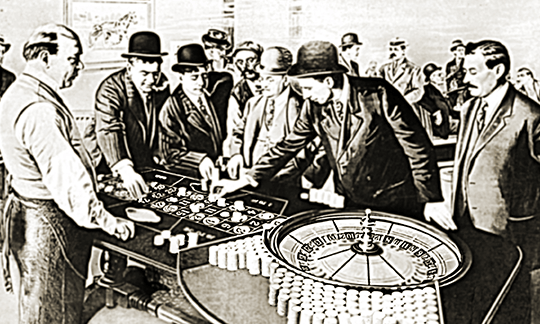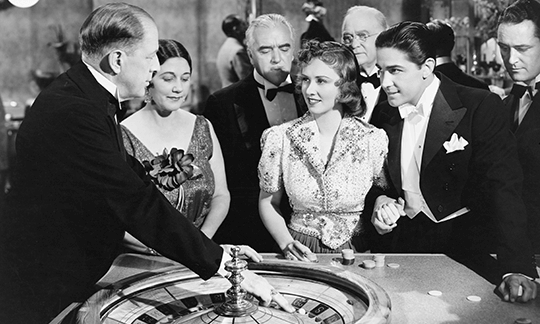Roulette History
The history of Roulette - a timeless Classic
The game around the Roulette wheel has fascinated millions for many centuries, be it in online casinos or their real world counterparts. Although there are different forms of Roulette, ranging from American Roulette to European Roulette and all the way to French Roulette, their origin lies in the accomplished french mathematician Blaise Pascal's research sometime in the 17th century, while he was hard at work trying to create a perpetual motion machine. However, evidenced by many historical depictions and stories, many ancient civilizations played games very similar to Roulette long before, long before topics like house edge became a thing on people's minds.

Roulette precursors among Ancient Greeks and Romans
In the past, Greek soldiers had their own ways of enjoying the thrill of gambling when they didn’t have a hailstorm of arrows and spears thrown at them. One of those games seems particularly similar to a modern-day version of Roulette. Soldiers would utilize the inside of one of their shields, draw symbols on it and place it on the ground. Then they would simply place a broken arrowhead next to it on the ground and give the shield a spin, betting on which symbol of this makeshift Roulette wheel would stop in front of the arrowhead.
Not much different were things in old Rome. Being a soldier was not a very fun occupation, even less so one that assured you a good future. Let alone the fact that besides their short life expectancy, they had to witness their comrades and friends getting injured and killed in battle on a daily basis. All of this was more than enough to bring down the soldiers’ morale, which in turn, meant reducing their effectiveness in combat drastically. To counteract this, commanders of the Roman army would try their best to give their soldiers an enjoyable pastime. So of course some form of gambling was a welcome change, and many of those games also included spinning a shield, a chariot wheel, or whatever could be used as a makeshift Roulette wheel.
Whilst this is only one out of many soldier games that can be related to Roulette, there simply isn’t enough evidence to support the claim that it is a Greek or even a Roman game.

The creators of the modern day Roulette
Given the name, Roulette is undoubtedly of french origin. Yet the gameplay and design elements are clearly influenced by two very similar games that were popularized in the 17th century in Europe. These two games were known as the “Roly Poly” and “Even-Odd”, which both included a wheel of sorts and betting on the outcome of a spin. Blaise Pascal, being a famous gambler, clearly knew about them whilst creating his own unique version of the wheel. Although gambling was mostly illegal in many countries in Europe and also not very popular at the time, the late 18th century saw the introduction of strict gambling laws. France and the rest of Europe were witnessing a revival of wagering games at the time and Prince Charles of Monaco, who was facing money issues, was seeking this opportunity and rise in popularity to alleviate them. His choice of opening several gambling houses in Monaco, with Roulette being prominently featured, became the reason for it being so popular among aristocrats and royalty alike. The Roulette wheel, or Roulette table for that matter, present there was almost identical to the one played today, with even the betting options being almost the exact same in modern online casinos. Numbers ranging from 1 to 36, a single zero and double zero pocket and the colours red and black were all represented.
How Roulette took over Europe
By now it shouldn’t come as a surprise if I told you that casino games would not be nearly as popular in today's world, if it weren’t for two very smart Frenchmen by the name of Francois and Louis Blanc. They were the ones who invented what we know as European Roulette. Compared to the American Roulette, the European version does not include the double zero pocket, a key difference when it comes to a player's chances of winning. Due to gambling being illegal in France at the time, they moved to Hamburg, Germany, and introduced their new game to the gambling community there in 1842. Having only a single zero slot in a Roulette game causes the house edge to drop to approximately 2,70 %, which is almost half of what it is on an American Roulette wheel, where a house edge of roughly 5.20 % is present due to the double zero being included. These higher win chances caused the single zero Roulette to replace the double zero variation. As you can imagine, the game found way more traction in Germany than in France and quickly became a people’s favourite. With this newfound success, they returned to France several years later, where, at the request of Prince Charles of Monaco III, they established what would later be known as the world’s first modern casino. Most versions of online roulette in online casinos are based on the European version.
Nowadays there are few scenes as emblematic as groups of players gathered around a Roulette table. Be it double zero or single zero variant, house edge is barely spoken about. People enjoy the pace and seeing how other people fare right in front of them. This social aspect is perhaps a key reason as to why Roulette has withstood the test of time and managed to become popular across cultures and continents.
20p Roulette is one of the Roulette games hosted in our casino.










